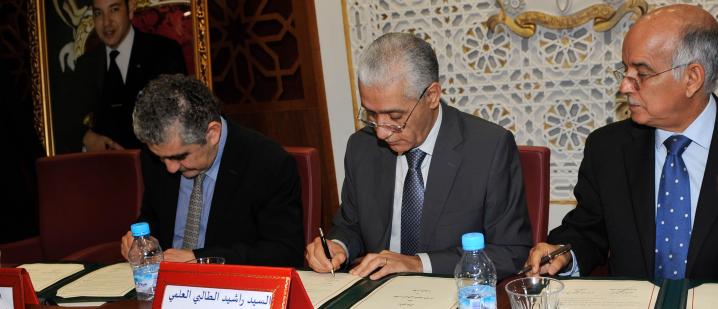CNDH and Moroccan Parliament decide to strengthen and institutionalize cooperation to implement Belgrade Principles

Commemorating the sixty-sixth anniversary of the Universal Declaration of Human Rights, the National Human Rights Council (CNDH), represented by Driss EL Yazami, Chairman, signed on Wednesday, December 10, 2014 in Rabat two (identical) Memorandums of Understanding with the Moroccan Parliament; one with the House of Representatives, represented by Speaker Rachid Talbi Alami and the other with the House of Councillors, represented by Speaker Mohamed Cheikh Biadiallah.
Through these memos the CNDH aims to develop a strong working relationship with Parliament and encourages the legislative institution to adopt a human based rights approach in drafting and amending laws.
The three parties highlighted in their statements the importance of the human rights based approach in legislating but also monitoring the decisions of the government, evaluating public policies, and in strengthening parliamentary diplomacy. The CNDH will thus be more able to advise and/or make recommendations to Parliament on issues related to human rights, including the State’s international human rights obligations, the content and applicability of a proposed new law with respect to ensuring human rights norms and principles are reflected therein,
They also have common objectives the implementation and coordination of programs focusing on consulting the CNDH on the evaluation of public policies with a human rights perspective and study of the impact of international rights conventions projects rights and international humanitarian law in anticipation of or in the ratification of the national legal arsenal and the commitments made by the Kingdom in the field of human rights, etc.
Parliament and the CNDH will develop, in implementation of these memos, a common strategy to systematically monitor the implementation of the recommendations of regional and international human rights mechanisms, not to mention capacity building on international human rights law and the international humanitarian law for stakeholders concerned. The parties also undertake to hold joint activities to promote the culture of human rights.
Speaking at the signing ceremony, the CNDH Chairman welcomed the fact that the parliament Houses responded positively to this initiative and to CNDH's proposal to commemorate the Human Rights Day at the parliament premises and to officially implement the Belgrade Principles. This initiative is not the first sign of fruitful cooperation between Parliament and the Moroccan NHRI. Earlier efforts have been made to strengthen cooperation between these two institutions, not to mention the fact that 8 board members represent Parliament at the CNDH. The two Houses of Parliament have already included provisions in their bylaws to institutionalize cooperation between the parliament and the national institutions for human rights and freedoms, good governance and participatory democracy, including the CNDH.
Only few countries in the world have actually started implementing the Belgrade Principles on the relationship between parliaments and national institutions for the promotion and protection of human rights (NHRIs).






















